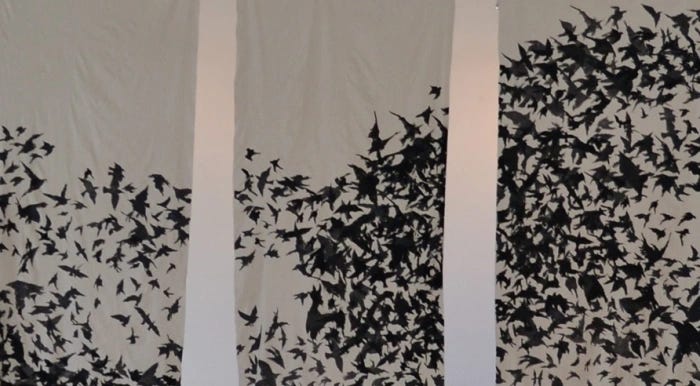Flocking to a new future
Part of Vuli Nyoni's 'Murmuration' at the GUS Art Gallery in Dorp Street last year.
There is no doubt that the Rhodes statue should move from its current location. It should have moved a long time ago. The remarkable thing is not that there are students – black and white – that demand its removal. Instead, it is remarkable that a man that caused so much pain expropriating the lands of blacks across southern Africa and Boers in the Republics could escape the furies of so many for so long. Not anymore.
#RhodesMustFall is a no-brainer. But what should substitute Rhodes' statue is the far more difficult question. Not only on the premises of UCT, but across South African campuses. Offensive names across the country – like the DF Malan centre at Stellenbosch University (despite my attempts last year to suggest that it can be seen as a victory over the past) – have changed. But, as far as I can see anyway, there is no discussion about forging a new, inclusive identity. This has to do with the unfortunate way the Rhodes statue has given rise to groups that want to score cheap political points; the poo-throwing, militaristic, nationalistic and even extremist sentiments expressed in many of the student meetings are an unhappy result of UCT dragging its feet. Now Rhodes' statue will fall at the hands of opportunists instead of a progressive movement for change. It's necessary to recast the past, of course. It's also easy. What is much more difficult is to define an inclusive vision of the future.
So let me try. On Thursday evening I attended the International Food Evening at Stellenbosch University. More than a thousand students descended on Academia residence to taste the cuisine of our international visitors; food from Belgium (who won first prize) to Zimbabwe (who came third) was on offer, as well as that of 23 other countries. It was fun and festive, delicious and diverse. These are not the pictures, unfortunately, the Cape Times report on their cover, because they don't fit the stereotypical image of Stellenbosch as the last bastion of Afrikaner racism. Instead, Congolese and Canadian, Zulu and Zambian, Swazi and Swiss, Angolans and Afrikaners were conversing under the stars, tasting foreign foods and drinking beer. That image, to me at least, represents a future Stellenbosch, and a future South African society.
That is, a society that is not uniform (where we all look, think, act the same), but united in our purpose to build a prosperous society for all. For too long in our history, those in power had a vision of South Africa that excluded those who lived in it: Rhodes' vision of a British Empire in Africa had no space for black or Boer. The Afrikaners' vision of apartheid South Africa had no space black South Africans. And, in truth, the current regime seems to hell bent on disenfranchising amakwerekwere, Africans from countries outside South Africa. A recent estimate suggests that at least 5% of the people in this country are Zimbabweans, more than 3 million in total. What is happening to them is much the same as what happened to blacks during apartheid.
How do we build this inclusive, prosperous future? First we must step away from the strive toward uniformity. Nationalism is an idea that has been tried before and it has failed, again and again. When we flock, as Vuli Nyoni pointed out in an US/Leuven Thinktank seminar earlier on Thursday evening, we tend to lose track of our personal convictions, our personal identities. Perhaps our emphasis on ubuntu – I am who I am through other people – has made us (and here I include not only black South Africans because I think Afrikaners have this characteristic too) prone to groupthink, or flocking. Birds of a feather flock together is what we like to say, but instead of shared appearances we should be focusing on a shared purpose.
Second, we must grow. I don't want to discuss economic policy here, but consider the collective entrepreneurial spirit of the Asian countries over the last three decades. Government, business and civil society shared a vision of a prosperous future, implementing pro-growth policies that allowed millions to escape poverty and thousands to become millionaires. India, China, and South Korea, despite their own legacies of colonialism, now have large middle classes that can enjoy the fruits of capitalism. South Africans, by focusing so much on the injustices of the past, should be wary of trying too hard to create a new past instead of a new future. Which brings me back to Rhodes' statue. What will replace it? Once we've (finally) destroyed the myth that we should all be English, or Afrikaans, or South African, what next? Que vadis young South Africa?


